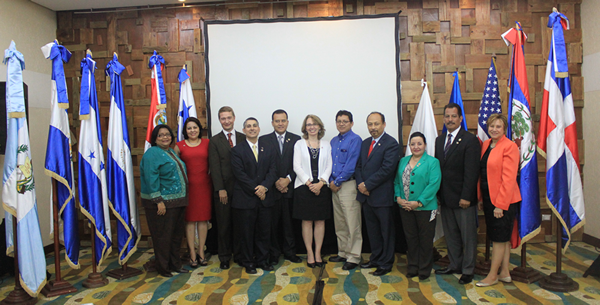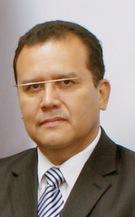Strengthening Public Health Leadership in Central America and the Dominican Republic
This web page is archived for historical purposes and is no longer being updated.

COMISCA representatives from Panama, Costa Rica, Nicaragua, Honduras, El Salvador, Belize and Dominican Republic; Dr. Oliver Morgan – CDC Dominican Republic Office Director; Dr. Nelson Arboleda – CDC Central American Regional Office Director; Dr. Cristina Rabadán-Diehl, Director of the Office of Global Affairs’ (OGA) for the Americas at the U.S. Department of Health and Human Services (HHS).
CDC identifies an ideal partner
It all started with the influenza pandemic in 2009. Countries of Central America proceeded to identify the need for a stronger and more coordinated region. CDC, which was already working in the region since the 1960s, recognized the opportunity to partner with the Council of Ministers of Health of Central America and the Dominican Republic (COMISCA) and to be part of this regional coordinating body.
COMISCA is composed of each of the Ministers of Health of the eight countries in the region: Belize, Costa Rica, Guatemala, El Salvador, Honduras, Nicaragua, Panama, and the Dominican Republic. COMISCA was formed to identify and prioritize regional health issues and is part of the political body of the Central American Integration System. The COMISCA Secretariat (SE-COMISCA) serves as a body that implements regional health activities year round and meets biannually with regional health officials to discuss progress and to plan for the next period.
In 2010, a cooperative agreement between SE-COMISCA and the CDC Central American Regional Office (CDC/CAR) was created with the name “Improving Health Surveillance through networking, regional coordination and strengthening of technology, communication and training in epidemiology to improve emergency response in public health under the International Health Regulations and the Health Plan for Central America and the Dominican Republic”, with four main strategic objectives to be developed in the period of 2010-2015.
It is only now that we have looked back and seen how far we have come. Significant advances have been made for each of the four strategic objectives. We can see how the Central American region has worked and harmonized the HIV/AIDS health indicators. We can also see they have created National Plans to prepare and respond to health emergencies in the regional and National Strategic Plans to strengthen the HIV epidemiological surveillance systems both plans were derived from needs identified in the assessments made by SE-COMISCA working hand in hand with CDC. The region has developed Influenza Sentinel Surveillance services and thousands of Central American Professionals have received training in epidemiology, laboratory quality assurance, new relevant diagnostic tools, risk communication, and data analysis. The agreement also enhances regional cooperation and creates a surveillance platform to share public health information while supporting the regional implementation of WHO/PAHO International Health Regulations.
Secretariat COMISCA: CDC as a strength

Dr. Julio Valdes, Secretariat of SE-COMISCA
Dr. Valdés, Secretariat of SE-COMISCA, appreciates CDC’s commitment within the region of Guatemala. He sees CDC’s role as a “strong technical and financial arm” of SE-COMISCA and COMISCA. The health services and the population of Central America in particular have benefited tremendously from this collaboration. Dr. Valdés considers CDC as a critical piece in the success that has been accomplished since the creation of SE-COMISCA and appreciates CDC’s full involvement in the implementation of the Regional Health Policy, knowing that its input will benefit greatly the Central American integration.
This past June, COMISCA held its bi-annual governance meeting in Santo Domingo, Dominican Republic. Dr. Lorenzo Hidalgo, Minister of Health of the Dominican Republic, presided over the meeting as President Pro Tempore of COMISCA. CDC Director Dr. Tom Frieden’s pre-recorded words in a video congratulating COMISCA for their great work in the region was a brilliant ice breaker. SE-COMISCA and CDC’s collaborative work was backed up and recognized as important for U.S. as much as for the countries members of COMISCA. Dr. Cristina Rabadán-Diehl, Director of the Office of Global Affairs’ (OGA) for the Americas at the U.S. Department of Health and Human Services (HHS), attended the meeting and presented on HHS’ engagement in the region. During the meeting, Dr. Rabadán-Diehl also provided an overview of the Global Health Security Agenda (GHSA). It was a tremendous opportunity to discuss the potential engagement of the COMISCA member countries in the implementation of the GHSA. Dr. Nelson Arboleda, Regional Director for CDC’s Central American office based in Guatemala, and Dr. Oliver Morgan, CDC’s Dominican Republic Office Director also participated in this important meeting.
SE-COMISCA has helped CDC to achieve the goals planned in the Central American Region

Dr. Nelson Arboleda, CDC Central American Regional Office Director.
All of these efforts we have made in the past four years become even more important now with the U.S. Government Global Health Security Agenda, aiming to improve the ability of countries to prevent, detect and respond to threats around the world, including Central America. I have been able to see the improvement in coordination, communication, and networking capacities of the eight countries of the region. The threat Central America is currently facing with Chinkungunya has been a clear example of the utmost importance of collaboration and information sharing among countries. SE-COMISCA has been the glue that promotes this communication and coordinated work. We are very pleased to be working with a very strong and important public health partner and ally. These four years have been full of success stories and we are certain that this relationship will become even stronger and continue to be a source of great achievements for the U.S. and the Central American Region.
SE-COMISCA and CDC look forward to the continuation of this valuable collaborative work in Central America and the Dominican Republic.